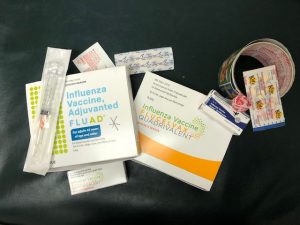
‘Tis (The Flu) Season
Just one hundred years ago 50 million people worldwide and 675,000 Americans died, not from war, but from a deadly influenza pandemic that had circled the globe. The most vulnerable were people over the age of 65, young children under two and those with certain medical conditions which increased their risk of contagion.
That was 1918. Today, despite the development of effective vaccines, flu can still be a deadly killer. Just last season alone, about 80,000 Americans died and more than 900,000 Americans were hospitalized with influenza, according to the Centers for Disease Control and Prevention (CDC) and the California Department of Public Health (CDPH)
Statistics showed that fewer than half of Americans were vaccinated against influenza last year.
We, as doctors, are urged to encourage our patients and staff to get vaccinated to help stop the disease from spreading especially to those more vulnerable, where the flu can cause more serious complications. High-risk groups include older adults, pregnant women, people with weak immune systems and chronic disease, and children under 5 years old.
The flu season officially starts on October 1st and lasts until the end of March but this varies from year to year. Sometimes the flu viruses can circulate until May.
Symptoms of flu are cough, sore throat, runny or stuffy nose, headaches, body aches, fatigue, chills, and sometimes fever, vomiting and diarrhea. You can be contagious from one day before symptoms develop until about seven days after symptoms appear.
Frequent hand washing and coughing into a tissue or a sleeve can help prevent the spread of influenza.
The most common reason patients give me for not taking the flu vaccine is “it gives me the flu”. This is a myth as the vaccine is not live and can’t cause the flu. However, it does take about two weeks after getting a flu shot to develop immune protection. Also you can still develop some symptoms even after taking the flu shot but it will not be as serious.
If you have any concerns about getting the flu vaccine, please talk to your family doctor who can tell you if there are any risks in your particular case. Developing a relationship with your primary care provider always ensures a tailor-made preventive health plan for you and your family. Here at Manhattan Family Practice, you will receive this individual care and attention at all visits.

For more information about this year’s flu shot, please visit the Centers for Disease Control and Prevention’s website by clicking the below link:
https://www.cdc.gov/flu/protect/keyfacts.htm





